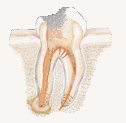
Dental Implant Pain
Many patients who want to replace missing teeth with dental implants are concerned about dental implant pain. Some degree of dental implant pain should be expected after an intrusive surgical procedure such as the placement of dental implants. Severe tooth pain after having dental implants is not normal and it is a sign of possible complications and implant failure.
Dental implant pain during the surgical procedure
Dental implant surgery involves the insertion of a titanium screw in the jaw bone which will play the same role as the root of a natural tooth and will act as an anchor for a permanent or removable restoration (crown, bridge or dentures).
During the surgery for the placement of dental implants the dentist makes an incision to the gums and drills into the jaw bone to prepare a socket for inserting the tooth implant. This may sound scary for many patients, who suppose that it must be a very painful procedure. Actually, it would be, if dental anesthetics were not available.
The reality is that you should not worry about dental implant pain during the procedure. The area of the mouth where the implant will be placed is numbed with several shots of anesthetic, so that you will not feel any pain. If the dentist is experienced in placing dental implants, the procedure is normally less traumatic for the dental tissues than a surgical extraction, and more comfortable for the patient than a root canal treatment.
Although there is no dental implant pain during surgery, some patients may feel a discomfort due to the length of the procedure and the nature of the surgery. Seeing your dentist drilling in your jaw may not be that comfortable even if you do not feel it. The main factors affecting dental implant pain and discomfort are:
- the difficulty of surgery
- the number of implants to be placed
- additional procedures such as dental bone graft or sinus lift that may be needed.
A dental implant surgery may be difficult for some patients, if the procedure involves several dental implants, or if dental bone grafting or sinus lift is required to provide the necessary jaw bone depth. In these more complicated cases, the dentist may recommend sedation dentistry to help the patient, especially for patients with a history of dental anxiety or dental fear.
Dental implant pain after surgery
After you have returned home from your dental implant surgery and the anesthetic begins to wear off, it is normal to feel some dental pain same as after any other oral surgery. The post-operative dental implant pain is usually mild, but it depends on how extensive and complicated the oral surgery was.
Having a single dental implant in a healthy and strong jaw bone may cause no pain at all. If any, the pain will not last more than 2 to 3 days. If several implants are needed and dental bone grafting is also performed, you should expect to experience dental implant pain for a few days or weeks. You may also have some swelling of the gums and face as well as bruising.
Before leaving the dental office after the surgery, your dentist will usually have prescribed anti-inflammatory drugs and over-the-counter analgesics for temporary pain relief. You can also use a cold compress or an ice pack to relieve dental implant pain and reduce the swelling.
If the oral surgery is properly performed by an experienced implant dentist, the post-operative pain is usually minimal and you will rarely need anything more than an over-the-counter analgesic to ease the dental implant pain.
A severe lingering pain after the dental implant procedure is usually a sign of surgery or post-surgery complications. You should contact your dentist and arrange an appointment to find out the cause of the problem.
Dental implant pain due to complications
Although implant dentistry has a very high success rate about 95%, sometimes complications may occur. They can be related either with errors during the implant surgery or with not following the dentist’s post-operative instructions.
Dental implant pain is the most common symptom of implant complications. Problems that may cause implant pain include the following:
- implant infection (peri-implantitis) is the most common problem leading to implant failure, and possible causes are poor disinfection during surgery, or poor oral hygiene after surgery
- wrong placement – wrong position, angle, height, leading to bad bite and excessive force on implant
- improper loading - too much compression while screwing resulting in pressure build up and inflammation of jaw bone
- wrong position – too close to adjacent natural tooth causing pain due to pressure
- nerve damage – jaw nerve may be damaged during drilling the implant socket causing chronic dental implant pain
- nerve pressure – the implant is placed too close to the nerve causing pain when it is pressed during chewing.
- implant rejection or fracture
Infections can be treated with antibiotics in combination with analgesics, in an effort to avoid implant failure. Nerve damage is the most serious of complications because it can lead to chronic severe pain and numbness of chin, cheek or lips.
Although tooth pain medicines can provide temporary pain relief, in most cases removing the implant is necessary to permanently stop the dental implant pain. When the problem is resolved, a new implant can be placed.
Severe pain after surgery must always be considered as an important warning sign that can help prevent more serious complications such as dental implant failure, bone infection and jaw bone loss.
How to prevent dental implant pain?
Proper execution of a dental implant surgery (which is your dentist’s responsibility) and proper aftercare (which is your own responsibility) are the main factors that can minimize the risk of dental implant pain after surgery. What you can do to help is:
- Select an implant dentist with training and experience in dental implants. Do not choose a dentist just because he offers the lowest prices.
- Follow carefully the post-operative instructions your dentist will give you after surgery.
- Keep your mouth clean. Pay special care to good oral hygiene.
- Visit your dentist immediately to check the cause of pain if you have abnormally strong toothache after the procedure, or if the pain starts to worsen some days after surgery.
Latest advancements in dentistry and new high-tech procedures being used by implant dentists have helped reduce post-operative complications and incidents of dental implant pain. CT-scans, computer aided planning and surgical guides used in techniques such as Teeth-in-an-Hour or All-on-4 have reduced placement errors and the related complications. In certain cases, the use of mini implants with narrower diameter has made these surgeries less invasive, almost eliminating post-surgery swelling and pain.

 Dental Insurance
Dental Insurance Tooth Abscess Pain
Tooth Abscess Pain Tooth Extraction Pain
Tooth Extraction Pain Toothache Medicines
Toothache Medicines